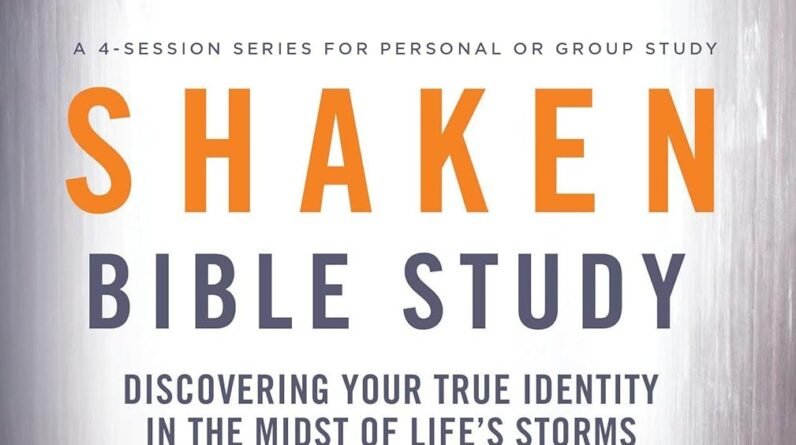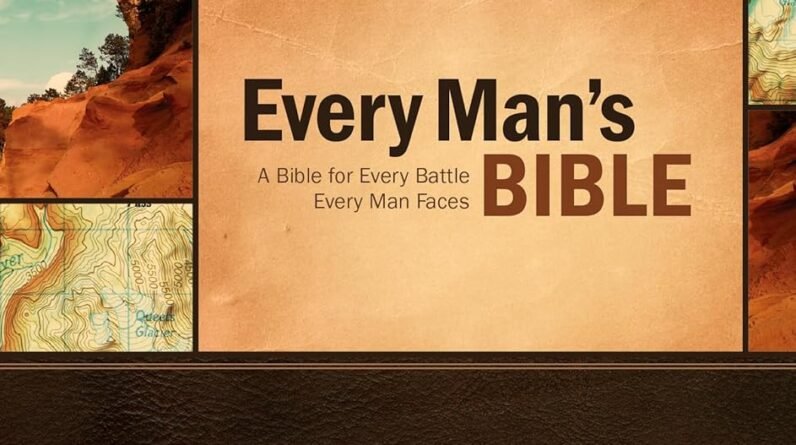Kick off a year of steady spiritual growth with The Bible in 52 Weeks for Men: A Yearlong Bible Study — a practical, week-by-week plan that helps you read, reflect, and apply Scripture in manageable steps so you can deepen your faith and strengthen your daily walk.

Discovering “The Bible in 52 Weeks for Men: A Yearlong Bible Study”
You’re holding in your mind the idea of a focused, sustainable plan to read and reflect on Scripture for a full year. “The Bible in 52 Weeks for Men: A Yearlong Bible Study” is designed to help you do precisely that — to make biblical engagement regular, meaningful, and tailored to the particular seasons men often move through. This is not a sprint or a quick devotional you skim through; it’s a yearlong pace that invites steady growth, honest reflection, and the formation of habits that last longer than 52 weeks.
As you approach the Bible with intention, this study provides structure without suffocating your freedom to wrestle with hard passages, celebrate spiritual milestones, or adapt to life’s ebbs and flows. The idea is that by breaking the Bible into weekly rhythms, you’ll be more likely to complete the journey, remember what you read, and actually apply it to the relationships, work, and choices that define your life.
Why a Yearlong Study Can Change Your Life
Embarking on a yearlong study gives you more than familiarity with Bible stories; it shifts how you live. Rather than treating Scripture as occasional reading material, the 52-week structure encourages you to treat the Bible as a daily resource for wisdom, comfort, and moral guidance. Over a year, your heart and habits can be reshaped through repeated exposure to key themes like covenant, mercy, repentance, and hope.
You’ll also notice that longer commitments change the kinds of transformation you experience. Short bursts of reading can energize you, but sustained engagement creates depth. Over twelve months you get to return to ideas, see how themes reverberate across different books, and apply lessons in multiple seasons. That continuity helps truth move from your head into your hands and feet — in how you lead, parent, work, and serve.
Who This Study Is For
This study is aimed primarily at men who want a practical, thoughtfully designed roadmap to reading the Bible in community or on their own. Whether you’re new to Scripture or you’ve read large sections before, the pace and prompts are meant to meet you where you are — not where some ideal version of you might be. If you’re juggling work, family, and community responsibilities and you want a plan that respects that reality, this study fits that need.
It’s also for men who value accountability and structure. If you’ve tried to read the Bible regularly but fell off track because the plan was too vague or the daily demands were unrealistic, a weekly approach could be what saves your consistency. The study supports both solitary reflection and group discussion, so you can benefit from the discipline of personal study and the sharpening that comes from talking with other men.
How the 52-Week Structure Works
At its simplest, the plan divides the Bible reading and reflection into 52 manageable weekly units. Each week includes a curated reading or set of passages, reflection prompts, prayer suggestions, and practical application ideas. The weekly format helps you create a dependable rhythm: read, reflect, apply, and move forward into the next week with continuity.
This structure also allows for flexibility. You don’t need to read at a specific time of day or lock into a rigid schedule; rather, each week gives you targets and guiding questions. If life gets hectic, you can adjust the timetable while still maintaining the weekly focus. That flexibility increases the chance you’ll finish the year while preserving the depth of engagement.

Weekly Rhythm: Read, Reflect, Respond
Each week invites three simple disciplines: reading the assigned passage(s), reflecting on what the text communicates, and responding by applying a specific action or practice in your life. The reading gives you content, reflection helps you internalize meaning, and response moves that meaning into behavior. When practiced consistently, that cycle trains you to see Scripture as a living guide rather than an abstract text.
You’ll find that this rhythm keeps your spiritual life both contemplative and practical. Reflection prompts nudge you to ask honest questions about where the passage intersects with your choices, while response suggestions give concrete ways to practice what you learn — whether through confession, service, conversation, or a change in daily routine.
Time Commitment and Flexibility
You don’t have to carve out hours every day to succeed with this study. Most weeks are designed so that 15–30 minutes several times during the week will suffice to complete the core elements. That low time-barrier is intentional; depth doesn’t require a constant time drain, just consistent attention over time.
Of course, there will be weeks when you can dive deeper — perhaps a weekend retreat or a morning free of obligations. The plan allows for you to expand the time in those seasons, making spiritual growth organic rather than forced. If life temporarily derails you, the weekly structure makes it easier to jump back in without feeling like you’ve failed.

The Balance of Old and New Testament
A complete yearlong study should expose you to both the Old and New Testaments, and this study aims to strike that balance. You’ll read foundational stories, prophetic texts, wisdom literature, the Gospels, and the Epistles, giving you a well-rounded overview of canonical themes and narrative arcs. That breadth helps you see continuity across Scripture and the ways God’s character and purposes unfold.
Encountering a variety of genres equips you to interpret difficult passages with greater nuance. Wisdom literature trains your heart for practical living, prophetic books sharpen your sense of justice and repentance, and the Gospels re-center you on Jesus’ life and teaching. By pacing these texts across the year, you get to revisit themes and observe how they connect.
Core Components of Each Week
Each weekly unit typically contains four core components that keep the study practical and immersive: a reading plan, reflection prompts, prayer guides, and application steps. These elements are designed to work together so you can read with both the head and the heart engaged, then move into actionable practice.
The reading plan outlines key passages to read, often grouped so you can see thematic connections or narrative continuity. Reflection prompts help you meditate on the meaning and ask questions that surface personal implications. Prayer guides shape your posture before God, and application steps translate insight into everyday behavior — small, sustainable practices that yield spiritual growth over time.
Scripture Reading Plan
The reading component lists passages for the week, often mixing narrative and teaching material. That combination helps you process doctrine alongside real-life stories. By following the sequence, you’ll gradually cover major portions of Scripture without feeling like you’re rushing through or getting stuck in one section for too long.
The weekly reading plan usually assumes a steady yet reasonable pace, allowing you to engage thoughtfully with what you read. You can choose to do the reading in one block or spread it across several shorter sessions, whichever better fits your rhythm.
Guided Reflections and Questions
Reflection prompts are crafted to help you think deeply about the text. They typically encourage you to consider the meaning, the historical context, and, most importantly, how the passage relates to your daily life. You’ll be asked questions aimed at uncovering your motives, attitudes, and patterns that the Scripture might be addressing.
These questions are practical, not merely academic. They’re meant to create moments of honest self-examination and deeper understanding, which is often the first step toward genuine transformation. When you answer them candidly, they become a mirror for your spiritual condition.
Practical Application and Habit-Building
Application steps are the bridge between learning and living. Each week suggests concrete ways to put biblical truths into practice — whether that’s initiating a difficult conversation, establishing a prayer habit, or practicing generosity. The suggestions are intentionally achievable so you can build momentum without feeling like change must be dramatic.
Over time, these small practices compound. A single act of obedience or a new habit may not seem like much in isolation, but repeated weekly, they shape character. The study’s design helps you focus on incremental progress rather than instant perfection.
Prayer Prompts and Accountability
Prayer prompts help you articulate responses to what you’re reading and open your heart to God. They often include petitions, confession cues, and thanksgiving prompts tailored to the themes of the week. Pairing prayer with study keeps your engagement relational rather than merely intellectual.
Accountability options — such as weekly check-ins with another man, a group discussion, or an accountability journal — help you stay honest and encouraged. Sharing insights and struggles prevents isolation and multiplies the impact of the study.

How to Use This Study Alone
When you use this yearlong study on your own, you’re free to set your own pace while maintaining the weekly commitments. Solitary study gives you the space to wrestle privately with difficult passages and to tailor your application steps specifically to your life. This personal focus can lead to significant breakthroughs in prayer life, Bible literacy, and spiritual discipline.
Create a simple routine: pick consistent times to read and reflect, keep a notebook for responses, and set a weekly accountability moment — even if it’s just a text to a friend that shares one insight. Solitude in spiritual formation is a laboratory for growth; use it to experiment with how Scripture reshapes your work, relationships, and rest.
How to Use This Study in a Men’s Group
Using the study with a men’s group amplifies its effectiveness. Group settings provide perspective, correction, encouragement, and a sense of shared purpose. When men gather to discuss the weekly prompts, you’ll find that questions you struggled with suddenly make sense through someone else’s story; likewise, your own insights can help others.
A men’s group can structure meetings around the weekly unit: check-in, a brief reading recap, group discussion on reflection questions, prayer, and follow-up on application steps. Rotating facilitation helps men learn leadership skills, and built-in accountability creates a culture where confession and encouragement are normal, not awkward.

Tips to Stay Consistent for 52 Weeks
Consistency isn’t about perfection; it’s about making a plan so good you won’t want to quit. Small, practical habits often outlast big, ambitious plans. To keep momentum, pick a few stability anchors: a consistent reading time, a physical place to study, and a short weekly review of what you’ve learned.
- Choose a specific time and location for your study to reduce friction and decision fatigue.
- Use short, achievable daily checkpoints rather than trying to do everything in one sitting.
- Share weekly goals with one or two other men to create gentle tension that keeps you moving.
- Celebrate milestones: mark the end of a quarter with a personal reflection or group meal.
These small anchors help you move through inevitable life interruptions without abandoning the yearlong commitment.
Integrating the Study into Your Daily Life
One of the strengths of the 52-week approach is that it’s built to interact with daily life. You’ll learn to bring Scripture into work decisions, family dynamics, and your leisure choices. This integration helps Scripture become a lens through which you evaluate priorities, not simply a weekend habit.
Try applying one insight from your weekly reading to a specific context: use a truth from Proverbs when resolving conflict, let Jesus’ teaching on humility shape a leadership decision, or practice generosity in an area you typically hold back. Over time, these applications reconfigure the way you approach daily choices.
Overcoming Common Challenges
Any sustained spiritual discipline faces obstacles. When you encounter them, the key is not to beat yourself up but to troubleshoot wisely. You’ll confront seasons of busyness, spiritual dryness, doubts, and the temptation to perform spirituality for approval. Each challenge has practical responses that keep you moving forward.
Embrace the idea of “graceful return”: if you miss weeks, don’t quit. Reassess your rhythm, adjust expectations, and re-engage. Use accountability to lean on others rather than internalizing failure. Remember, the goal is growth, not an unbroken streak.
Busy Schedule
When work, family, and life obligations ramp up, carve out minimal but meaningful windows for the study. Even ten minutes of focused reading and reflection can sustain your connection to the text. Batch your time if needed — read during a commute, reflect during a lunch break, or use weekend quiet to catch up.
Simplify the plan for high-demand periods rather than abandoning it. You can scale back the depth while retaining the habit, then increase engagement when your schedule stabilizes.
Dry Seasons of Faith
Dry seasons are normal; they don’t mean failure. During these times, prioritize faithful practices: read the text aloud, pray brief, honest prayers, and engage with a trusted friend who can listen and pray with you. Sometimes persistent discipline during dryness yields a deeper revival than bursts of spirituality during high seasons.
If ongoing dryness persists, consider shifting focus temporarily to simpler, more consoling passages — Psalms of lament, or the Gospels — until your spiritual appetite returns.
Doubt and Tough Questions
Scripture invites honest questions. If a passage confuses or troubles you, don’t sidestep the doubt. Make space in your weekly reflection to name the question, research context, consult trusted resources, and discuss it with a mentor or group. Doubt handled constructively can deepen faith rather than destroy it.
Approaching questions with humility and curiosity keeps you engaged with Scripture’s complexity rather than drifting toward shallow answers or avoidance.
Staying Accountable
Accountability works when it’s safe and consistent. Choose brothers you can trust who will speak truth in love, not judgment. Establish regular check-ins — weekly or biweekly — where you share struggles, wins, and practical next steps. Consistent, honest sharing protects you from isolation and fosters mutual growth.
Spiritual Growth You Can Expect Over a Year
If you commit to this study for a full year, expect to grow in biblical literacy, spiritual disciplines, and emotional maturity. You’ll find your prayer life becoming more conversational, your ethics more Scripture-informed, and your ability to navigate conflict more rooted in biblical wisdom. Because the study emphasizes application, you’ll likely see behavioral changes in how you lead, manage anger, show love, and steward resources.
Beyond skills and knowledge, a year of regular Scripture engagement often reshapes your identity. You begin to adopt God’s story about who you are — beloved, accountable, servant-hearted — and that deeper identity changes how you live in ways both visible and subtle.
Real-Life Benefits for Men
Men who complete this type of study often report practical benefits: clearer priorities, improved relationships, better emotional regulation, and a stronger sense of purpose. These changes affect homes, workplaces, and communities. The Bible’s repeated call to integrity, humility, and justice has real-world consequences when it’s taken seriously.
Engagement with Scripture also provides spiritual resilience. When life’s pressures mount, you’ll have a reservoir of biblical truth and practiced habits to draw on — a steadying anchor for seasons of change.
Using Technology and Resources to Complement the Study
You don’t have to rely solely on a printed book; technology can support your commitment. Use Bible apps for quick search and reading, podcast teaching for deeper context, and digital note-taking for easy review. Calendar reminders help you maintain a weekly rhythm, while group chat apps can facilitate check-ins and accountability.
Choose resources wisely: prioritize reputable commentaries, trusted teachers, and versions of the Bible that are both accurate and readable. Technology should simplify and deepen your study, not complicate or distract you.
Customizing the Study for Your Season of Life
Each life season demands different emphases. If you’re newly married, focus on passages about love and covenant. If you’re a father, prioritize texts on leadership and legacy. If you’re in a season of vocational change, readings on calling and trust may provide the most immediate comfort and clarity. The 52-week format allows you to center your weekly applications around what’s most pressing.
Customization isn’t the same as deviation. You’ll still follow the spirit of the study while making tweaks that keep the plan relevant and sustainable for your unique circumstances.
Frequently Asked Questions
Q: What if I fall behind in the reading schedule?
Falling behind is normal and recoverable. You can compress two weeks into one catch-up session or accept that you’ll proceed at a slightly slower pace and still gain significant benefits. The important thing is to prioritize consistent re-engagement instead of perfectionism.
Q: Can I do this study with men who aren’t from my church?
Yes. The study is well-suited for inter-church groups. The weekly questions focus on Scripture and practical application, which are universal. Be intentional about establishing shared expectations and a culture of respect across different backgrounds.
Q: How much theological background do I need?
No extensive background is required. The study is accessible to beginners while still providing depth for those more familiar with theological concepts. Reflection prompts and suggested readings help you dig deeper if you want more scholarly context.
Q: What if I disagree with an interpretation in the study?
Disagreement is an opportunity for conversation. Use group settings to discuss differing perspectives with humility. If you’re studying alone, treat it as a prompt for research and discussion with trusted mentors.
Q: Does the study require a specific Bible translation?
No single translation is required, though some versions are easier to read and understand in contemporary English. Choose a translation that balances accuracy and readability for you. Paraphrases are helpful for initial readability, but consider consulting a more literal translation for deeper study.
Q: How can I measure progress beyond completion?
Measure progress by changes in behavior, relationships, prayer patterns, and how Scripture shapes your decisions. Reflection journals and periodic self-assessments (quarterly reviews) can help you see spiritual growth more clearly than just marking weeks completed.
Practical Next Steps to Get Started Today
Start by deciding on one small commitment: commit to the first week for a defined amount of time and set your reading spot and time. Tell one or two men about your plan so you have immediate accountability. Gather basic tools: a Bible, a notebook, and perhaps a calendar reminder. Begin with curiosity rather than expectation, letting the first few weeks set a rhythm rather than a performance standard.
As you get comfortable, schedule periodic reviews where you reflect on what’s changed and adjust your application steps. Keep it simple and stay persistent; small steps taken consistently add up to significant spiritual maturity.
Conclusion
“The Bible in 52 Weeks for Men: A Yearlong Bible Study” is an opportunity to let Scripture shape your life in practical, sustained ways. Whether you study alone, with a friend, or in a men’s group, the weekly rhythm helps you move from reading to reflection to real-life application. Over one year, you can expect deeper biblical literacy, stronger spiritual habits, and tangible changes in how you lead, love, and live.
If this resonates with you, take the next step: commit to the first week, invite a friend, and create a simple accountability rhythm. The year ahead can be transformative if you let Scripture become not just something you know, but something you live.
Disclosure: As an Amazon Associate, I earn from qualifying purchases.







